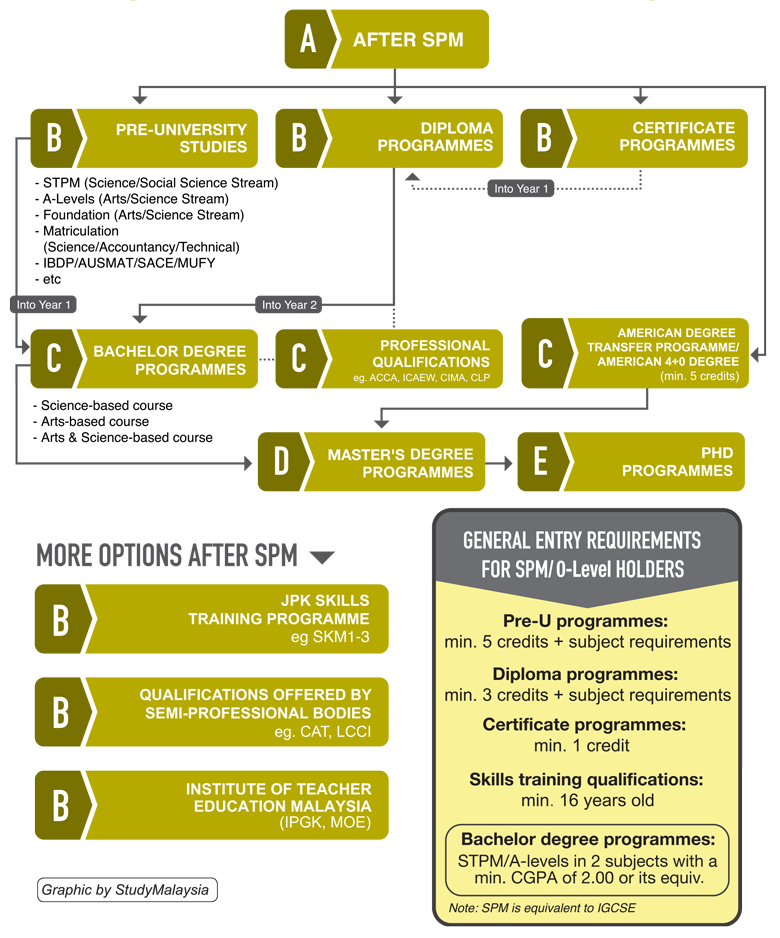Pathways to higher education in Malaysia
by StudyMalaysia.com on May 10, 2021 | Top Stories, Higher Education in Malaysia

You might be in your last year of secondary schooling and starting to consider what to do next. Or perhaps you’ve just left school and haven’t quite decided if you should continue with higher education. While you might dread more studying and exams, there are many benefits to pursuing a higher education qualification. College or university is important for many reasons—this includes long-term financial gain, job stability, job satisfaction, career success, and the chance to develop important skills in critical thinking, communication and leadership.
The following diagram gives you an overview of study options for students with SPM, IGCSE or O-level qualifications. It also shows the pathways for further study—from pre-university to doctoral level.
Diagram: An overview of study options - Types of Academic Qualifications and Education Levels

A. Academic qualifications
Pathways to a pre-U, diploma, certificate or American Degree Transfer Program
If you’re considering a pre-U qualification, you have many options to choose from—STPM, A-levels, foundation and matriculation. The general entry requirement for a pre-U programme is 5 credits at SPM level or its equivalent. However, some programmes may have specific subject requirements. The study duration at pre-U level is between 10 and 18 months. This is the shortest route to a bachelor degree programme.
For the route to a diploma programme, the general entry requirement is a minimum of 3 credits at SPM level. However, courses such as Diploma in Nursing has a higher entry requirement, i.e., 5 credits including maths and science. The duration of study is usually 2 years but some programmes take 2.5 years. With a diploma, you can join the workforce or if you wish to pursue a bachelor degree, you can usually obtain an exemption from year 1 and enter year 2 of the degree programme.
If you do not have the required SPM grades to pursue a pre-U programme or diploma, you can still consider studying for a certificate. The entry requirement is a minimum of 1 credit at SPM level. A certificate programme is a skills-based course which usually takes one year to complete. With a certificate, you can join the workforce or choose to further your studies by pursuing a diploma programme. (Note: There is no exemption and you will need to start at year 1 of the diploma programme.)
After completing a pre-u programme, you’ll be able to enter year 1 of a bachelor degree programme. Bachelor degrees typically take 3 years to complete; however, some programmes are longer—engineering and pharmacy programmes take 4 years, while medicine and dentistry take 5 years.
After pre-U, you can also opt to pursue a professional accounting course such as ACCA. If you study for ACCA after a bachelor degree, you may qualify for some exemptions.
To pursue an American Degree Program (ADP) after SPM, you’ll need a minimum of 5 credits. It usually takes 4 years to complete the ADP which can be done entirely in Malaysia or through the 2+2 route i.e., 2 years (60 credits hours) in Malaysia and 2 years (60 credits in USA).
Pathways to a bachelor degree qualification
The pathways to a bachelor degree include a pre-university qualification to enter year 1 or a diploma qualification to enter year 2 of a bachelor degree programme (subject to terms and conditions).
Pathways to professional qualifications after completing a bachelor degree
With a recognized bachelor degree qualification, you can move on to acquire a professional qualification in the field of Accounting, Medicine, Engineering, Architecture, Law, and others. A professional qualification is generally a qualification that is recognized and required by the relevant professional bodies which allow you to practise as a qualified professional in that field.
Pathways to postgraduate study
With a bachelor degree qualification, you can pursue a postgraduate programme, e.g. a master’s degree or a PhD, which is the highest level of academic qualification.
B. Skills-based qualifications
Skills-based qualifications awarded by DSD
If you have completed SPM or if you are at least 16 years old, you eligible to pursue a skills-based course. These qualifications are awarded by the Department of Skill Development (DSD) of Ministry of Human Resources. There are 5 qualification levels in The National Skills Qualification Framework: SKM 1, SKM 2. SKM 3, Diploma Kemahiran Malaysia (DKM), Diploma Lanjutan Kemahiran Malaysia (DKLM).
For more information and enquiry
- Check out more resources from StudyMalaysia that can help you plan your journey to further studies.
- Do you have questions or need advice about a particular course or career choice? Ask us here.
Source: Copyright © STUDYMALAYSIA (StudyMalaysia.com)
You May Also Be Interested In...
�5 Budget Tips Every Malaysian Student Should Know
![�5 Budget Tips Every Malaysian Student Should Know - StudyMalaysia.com]() As a student, our lifestyle tends to be a little more frugal as we don...
As a student, our lifestyle tends to be a little more frugal as we don...Applying for Foundation Programmes at Public Universities
![Applying for Foundation Programmes at Public Universities - StudyMalaysia.com]() If you have just sat for SPM last year and plan to continue your highe...
If you have just sat for SPM last year and plan to continue your highe...Are you considering a career in accounting and finance?
![Are you considering a career in accounting and finance? - StudyMalaysia.com]() OK, so you've done your research – you know that a career in ac...
OK, so you've done your research – you know that a career in ac...�An Opportunity for a Liberal Arts Education, a Scholarship, and an Experience of a Lifetime
![�An Opportunity for a Liberal Arts Education, a Scholarship, and an Experience of a Lifetime - StudyMalaysia.com]() This piece of news about education is simply too good not too share. W...
This piece of news about education is simply too good not too share. W...A sweet date this Raya - Raisin Oatmeal and Date Cookies
![A sweet date this Raya - Raisin Oatmeal and Date Cookies - StudyMalaysia.com]() It’s time to crank up the oven and get your siblings, friends and co...
It’s time to crank up the oven and get your siblings, friends and co...Careers in languages and linguistics - 10 sectors you can explore
![Careers in languages and linguistics - 10 sectors you can explore - StudyMalaysia.com]() So you want to study language and linguistics but you’re not sure wh...
So you want to study language and linguistics but you’re not sure wh...





























